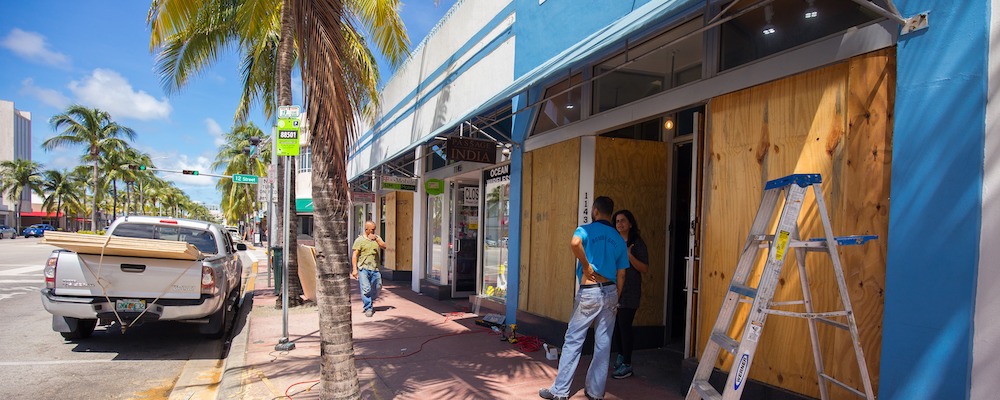 Shop owners in Miami Beach brace for Hurricane Irma in 2017. Source: Shutterstock Images.
Shop owners in Miami Beach brace for Hurricane Irma in 2017. Source: Shutterstock Images.
Natural hazards mitigation is crucial to protect communities from the impacts of disaster, but more research is needed to understand what’s effective.
That’s why the Natural Hazards Center is excited to announce that we’ve partnered with the Federal Emergency Management Agency and the National Science Foundation to create the Mitigation Matters Research Program—a new small grant initiative that will enable innovative natural hazards mitigation research.
The program will prioritize new research proposals that address the social, behavioral, and economic aspects of mitigation or entail interdisciplinary approaches on the intersection between humans, hazards risk, and the built environment. Research on how to translate existing evidence on persuasive communication, decision-making, and risk aversion into a hazards mitigation framework is also encouraged.
“Although we know that mitigation works, knowing isn’t enough to motivate behavior change,” said Grant Administrator Courtney Welton-Mitchell. “This research initiative will help us to better understand how to translate knowledge into action.”
Proposals for the Mitigation Matters Research Program will be solicited twice each year. The first call for submissions is now open and will be accepted through October 1, 2019 at 7:00 p.m. Eastern. The next round of proposals will be solicited early in 2020.
More about the initiative’s philosophy, definitions, and submission process is available on the Natural Hazards Center Mitigation Matters Research program webpages. Some areas we are especially interested in exploring further are:
- Ways to incentivize individual and collective behavior that increases the adoption of mitigation alternatives.
- Mitigation activities associated with less frequently studied hazards or adaptation to climate change.
- Planning that links infrastructure to capital improvement plans for enhanced risk analysis and hazard mitigation.
- Mitigation that includes (or excludes) especially vulnerable populations, low-income communities, or marginalized groups such as tribal populations.
- Methods and metrics that evaluate the effectiveness of mitigation strategies.
More Information
To receive news about Mitigation Matters and other Natural Hazards Center opportunities, including calls for proposals, please subscribe to the Small Grants Programs information list.
The Natural Hazards Center also supports research collaboration through its National Science Foundation-supported Social Science Extreme Events Research network (SSEER), which helps researchers connect based on location, research interests, topical expertise, and other factors. Social scientists are invited to join the network and can access research resources such as training modules and briefing sheets through the CONVERGE facility.
For questions or more information, please contact Courtney Welton-Mitchell at mitigationmatters@colorado.edu.